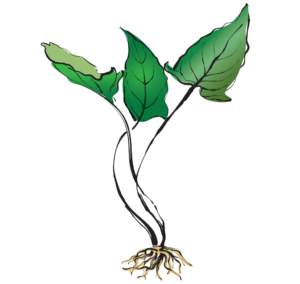Bai Fu Zi
English Name: giant typhonium rhizome
Pharmaceutical Name: Rhizoma Typhonii
Medica Category: Phlegm-Resolving Herbs
Properties: Bai Fu Zi enters the Spleen and Stomach channels; it is acrid and sweet in natue and warm in temperature.

What is Bai Fu Zi?
The Chinese Herb Bai Fu Zi is the processed rhizome/tuber from a plant in the Ariaceae family (related to the jack-in-the-pulpit) that is cultivated in Guangdong, Guangxi, Jilin, and Yunnan provinces. In English it is referred to as Giant Typhonium (Typhonium giganteum Engl.; syn. Sauromatum giganteum (Engl.) Cusimano & Hett.). The raw, unprocessed plant is toxic and so the tubers must be processed by washing and soaking with alum for use as medicine.

Traditional Chinese Medicine (TCM) Therapeutic Actions of Bai Fu Zi
Bai Fu Zi dries dampness, dispels wind, and dissolves phlegm from the channels and collaterals to relieve muscle spasms and cramps. It is commonly used in China to treat infantile convulsions, tremors, seizures, and post-stroke complications (e.g. paralysis and deviation of the mouth and eyes). It also can be used to treat certain types of headaches/migraines (usually those with an abrupt onset and severe pain on one or both sides of the head).
Bai Fu Zi can be used internally or topically to eliminate toxins and dissipate nodules to address scrofula, thyroid nodules, and other phlegm accumulations.
—safety notes:
Unprocessed Bai Fu Zi is toxic and should not be used internally; furthermore, internal dosage should not exceed 5g.
Contraindicated during pregnancy.
Contraindicated for wind-stroke due to Liver fire.
